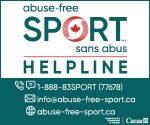Indigenous and Northern Affairs Canada supports Aboriginal Long-Term Participant Development in First Nations Schools
 Four Indigenous schools are benefiting from funding that Indigenous and Northern Affairs Canada (INAC) has distributed this year. The New Paths to Education Program grant was introduced to improve the quality of education in First Nations schools and promote innovative approaches in education. The Aboriginal Long-Term Participant Development Pathway (ALTPD), a joint creation between the Aboriginal Sport Circle and Sport for Life, was used as a roadmap for INAC’s physical activity and sport grant theme.This is the first year that the New Paths for Education Program has offered the physical activity and sport grant theme.
Four Indigenous schools are benefiting from funding that Indigenous and Northern Affairs Canada (INAC) has distributed this year. The New Paths to Education Program grant was introduced to improve the quality of education in First Nations schools and promote innovative approaches in education. The Aboriginal Long-Term Participant Development Pathway (ALTPD), a joint creation between the Aboriginal Sport Circle and Sport for Life, was used as a roadmap for INAC’s physical activity and sport grant theme.This is the first year that the New Paths for Education Program has offered the physical activity and sport grant theme.
These funds will support the Traditional Games and Physical Literacy Teacher Mentorship project, which aims to support overall school effectiveness by delivering quality activity within First Nations schools through physical education and other curriculum subjects. The project goal is to determine if the benefits of enhanced physical literacy programming extend beyond the gymnasium and will enhance attendance and overall student engagement. The project will enable teachers to deliver physical literacy-enriched traditional games and cultural activities that are developmentally appropriate by providing them with training, mentorship, equipment, and lesson plans. These leaders within the communities mentor by working alongside classroom teachers over a 20-week period to enhance how they deliver physical education and bring movement and culture into their classroom settings.
A teacher at one of the schools involved in the pilot project explains the positive influence of the program, saying, “The children are getting more physical activity and they are able to be more attentive and engaged in the other subjects.”
The project is being piloted in the following four First Nations schools across Canada and will run until the end of March 2018:
- ʔaq̓amnik School, Ktunaxa Nation – British Columbia
Local Delivery Partner: Sandi Lavery and Ktunaxa Nation Council
- ȽÁU, WELṈEW̱ School, Tsartlip, Pauquachin, Tseycum, Tsawout Nations –British Columbia
Local Delivery Partner: PISE (Pacific Institute for Sport Excellence)
- Paul First Nation School, Paul First Nation – Alberta
Local Delivery Partner: Ever Active Schools
- Kitaskinaw School, Enoch Cree First Nation – Alberta
Local Delivery Partner: Ever Active Schools
The four schools have been working with the Sport for Life Society in partnership with Aboriginal Sport Circle throughout this pilot. The Traditional Games and Physical Literacy Teacher Mentorship project will provide teachers with training and mentorship around physical literacy and the Aboriginal Long-Term Participant Development Pathway. The project was created to align with the FUNdamentals and Learn to Train stages of the Aboriginal Long-Term Participant Development Pathway. In the Truth and Reconciliation Report, sport and recreation are identified as tools for social development to improve the health and well-being of individuals and communities. Chief Willie Littlechild, Commissioner for the Truth and Reconciliation Commission, noted the significance of theAboriginal Long-Term Participant Development Pathway, stating, “It is an important resource and I have no doubt that its implementation will make a significant contribution to the health and wellness of our people and communities.” This is the underlying rationale for the project – to help build healthier Aboriginal people who contribute to healthier communities. By developing physical literacy, these children will gain the movement skills, the confidence, and the motivation to pursue sport and physical activity opportunities that interest them throughout their lives.
Sport for Life Society
The Sport for Life Society is recognized as the global experts on the Canadian Sport for Life Movement, Long-Term Athlete Development, and physical literacy development. The purpose of the Canadian Sport for Life Movement is to improve the quality of sport and develop physical literacy. Sport for Life links sport, education, recreation, health and governments to align community, provincial, and national programming. Long-Term Athlete Development is a multistage training, competition and recovery framework guiding an individual’s pathway through sport and physical activity from infancy through all phases of adulthood. Physical literacy is the motivation, confidence, physical competence, knowledge and understanding to value and take responsibility to be active for life.Sport for Life, as a social enterprise using Long-Term Athlete Development and physical literacy, works to be a catalyst for positive change.
Aboriginal Sport Circle
The Aboriginal Sport Circle is Canada’s national voice for Aboriginal sport, which brings together the interests of First Nations, Inuit and Metis peoples. Established in 1995, the Aboriginal Sport Circle was created through a national consensus-building process, in response to the need for more accessible and equitable sport and recreation opportunities for Aboriginal peoples. For more information, visit www.aboriginalsportcircle.ca
For more information, contact:
Lea Wiens
INAC Project Manager, Sport for Life Society
lea@sportforlife.ca

